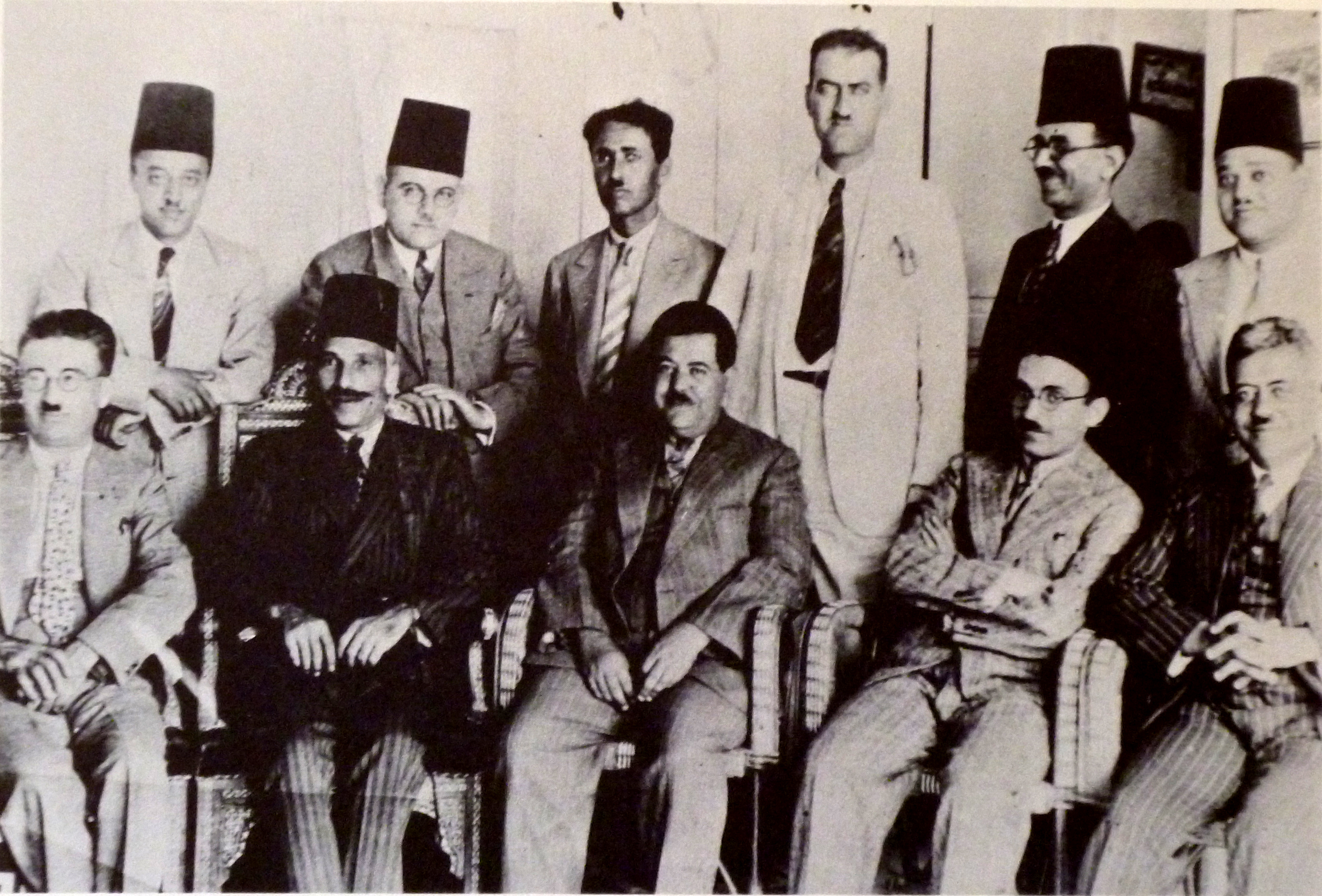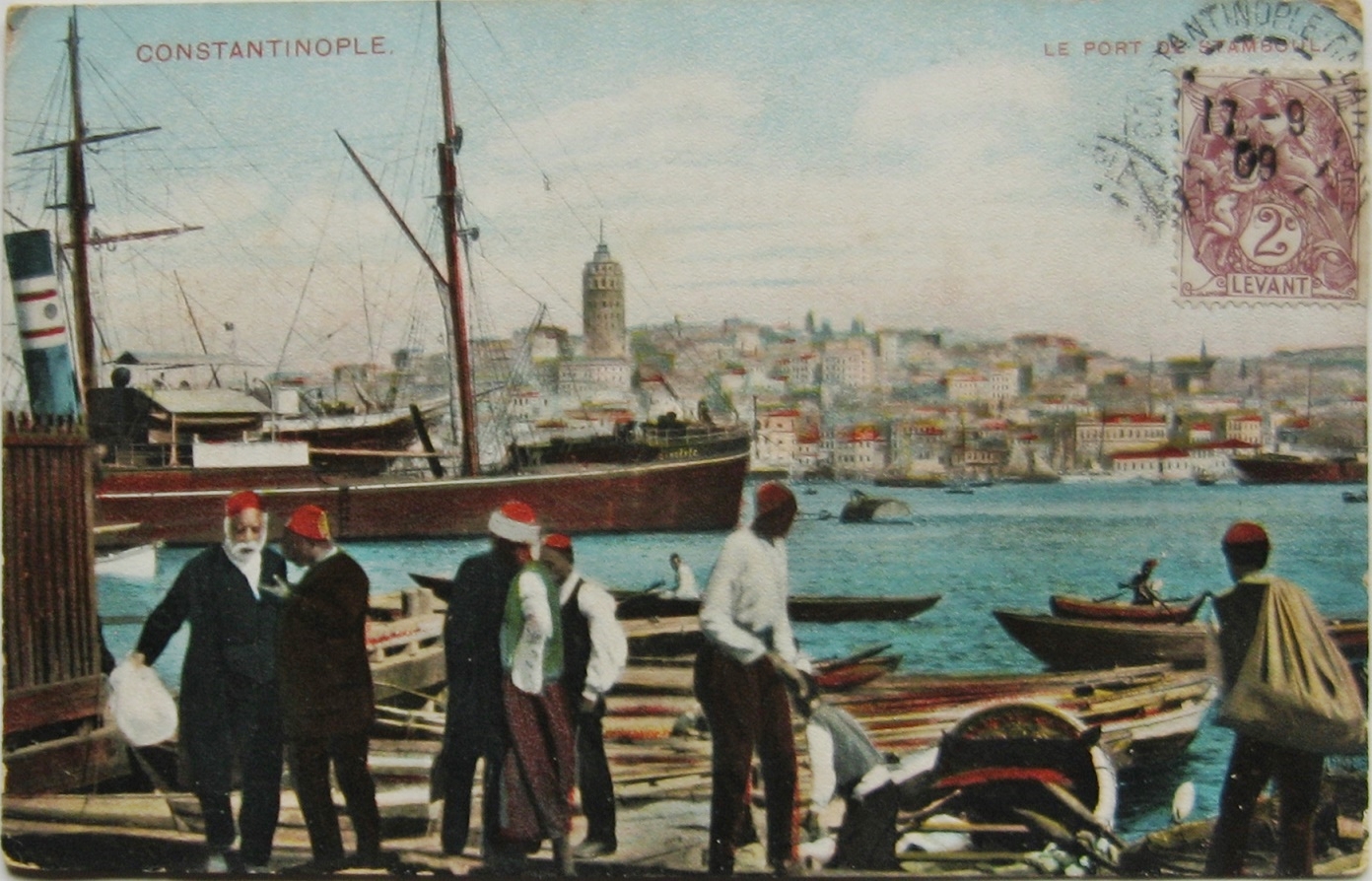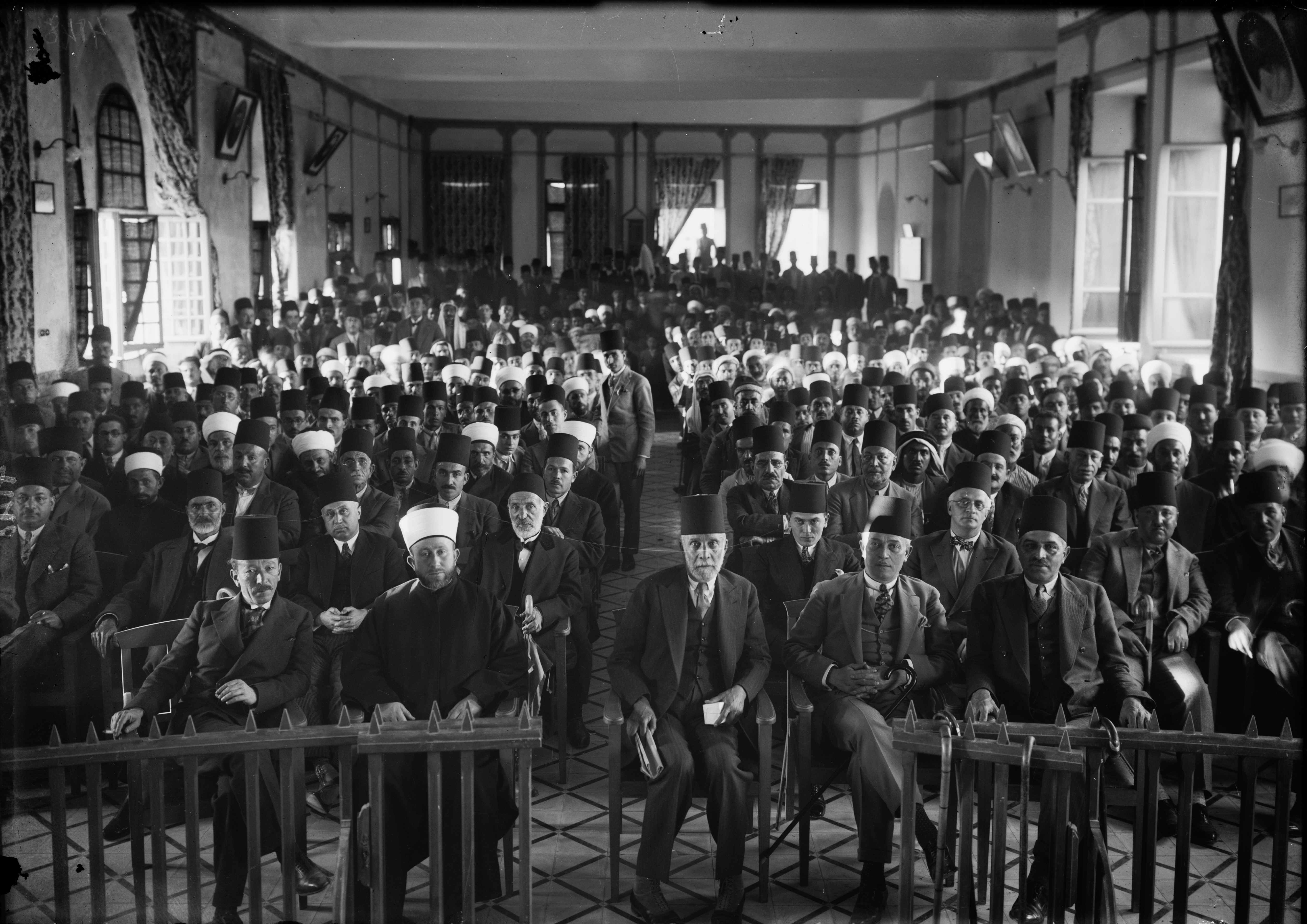|
Izzat Darwaza
Muhammad 'Izzat Darwaza (; 1888–1984) was a Palestinian politician, historian, and educator from Nablus. Early in his career, he worked as an Ottoman bureaucrat in Palestine and Lebanon. Darwaza had long been a sympathizer of Arab nationalism and became an activist of that cause following the Arab Revolt against the Ottoman Empire in 1916, joining the nationalist al-Fatat society. As such, he campaigned for the union of Greater Syria (modern-day Levant) and vehemently opposed Zionism and foreign mandates in Arab lands. From 1922 to 1927, he served as an educator and as the principal at the an-Najah National School where he implemented a pro-Arab nationalist educational system, promoting the ideas of Arab independence and unity. Darwaza's particular brand of Arab nationalism was influenced by Islam and his beliefs in Arab unity and the oneness of Arabic culture. Later, Darwaza co-founded the nationalist Istiqlal party in Palestine and was a principal organizer of anti-B ... [...More Info...] [...Related Items...] OR: [Wikipedia] [Google] [Baidu] |
Independence Party (Palestine)
The Independence Party of Palestine (''Hizb al-Istiqlal'') was an Arab nationalist political party established on 13 August 1932 in Palestine during the British Mandate. The party was founded by Muhammad Izzat Darwaza, and the other founders of the party were Fahmi al-Abboushi, Mu'in al-Madi, Akram Zu'aytir, ‘Ajaj Nuwayhid, Rashid al-Haj Ibrahim, Subhi al-Khadra, and Salim Salamah. The party did not achieve a large membership but Awni Abd al-Hadi, through his role as private secretary to Amir Feisal in Damascus between 1918-1920, had good relations with many senior leaders across the Arab world. Its origins lay in the Istiqlal movement associated with the short-lived Sharifian government in Damascus. The party's creation was spurred by the al-Husayni–Nashashibi rivalry, which had almost paralyzed the Palestinian national movement. Its founders, most of whom hailed from the Nablus area, called for the adoption of new methods of political action, including noncooperatio ... [...More Info...] [...Related Items...] OR: [Wikipedia] [Google] [Baidu] |
Levant
The Levant ( ) is the subregion that borders the Eastern Mediterranean, Eastern Mediterranean sea to the west, and forms the core of West Asia and the political term, Middle East, ''Middle East''. In its narrowest sense, which is in use today in archaeology and other cultural contexts, it is equivalent to Cyprus and a stretch of land bordering the Mediterranean Sea in Western AsiaGasiorowski, Mark (2016). ''The Government and Politics of the Middle East and North Africa''. p. 5: "... today the term ''Levantine'' can describe shared cultural products, such as Levantine cuisine or Levantine archaeology". .Steiner & Killebrew, p9: "The general limits ..., as defined here, begin at the Plain of 'Amuq in the north and extend south until the Wâdī al-Arish, along the northern coast of Sinai. ... The western coastline and the eastern deserts set the boundaries for the Levant ... The Euphrates and the area around Jebel el-Bishrī mark the eastern boundary of the northern Levant, as d ... [...More Info...] [...Related Items...] OR: [Wikipedia] [Google] [Baidu] |
Palestinian Nationalism
Palestinian nationalism is the national movement of the Palestinian people that espouses Palestinian self-determination, self-determination and sovereignty over the region of Palestine.de Waart, 1994p. 223 Referencing Article 9 of ''The Palestinian National Charter of 1968''. The Avalon Project has a copy her/ref> Originally formed in the early 20th century Anti-Zionism, in opposition to Zionism, Palestinian nationalism later internationalized and attached itself to other ideologies; it has thus rejected the Israeli-occupied territories, occupation of the Palestinian territories by the government of Israel since the Six-Day War, 1967 Six-Day War. Palestinian nationalists often draw upon broader political traditions in their ideology, such as Arab socialism and ethnic nationalism in the context of Muslim religious nationalism. Related beliefs have shaped the government of Palestine and continue to do so. In the broader context of the Arab–Israeli conflict in the 21st century, ... [...More Info...] [...Related Items...] OR: [Wikipedia] [Google] [Baidu] |
Egypt
Egypt ( , ), officially the Arab Republic of Egypt, is a country spanning the Northeast Africa, northeast corner of Africa and Western Asia, southwest corner of Asia via the Sinai Peninsula. It is bordered by the Mediterranean Sea to northern coast of Egypt, the north, the Gaza Strip of Palestine and Israel to Egypt–Israel barrier, the northeast, the Red Sea to the east, Sudan to Egypt–Sudan border, the south, and Libya to Egypt–Libya border, the west; the Gulf of Aqaba in the northeast separates Egypt from Jordan and Saudi Arabia. Cairo is the capital, list of cities and towns in Egypt, largest city, and leading cultural center, while Alexandria is the second-largest city and an important hub of industry and tourism. With over 109 million inhabitants, Egypt is the List of African countries by population, third-most populous country in Africa and List of countries and dependencies by population, 15th-most populated in the world. Egypt has one of the longest histories o ... [...More Info...] [...Related Items...] OR: [Wikipedia] [Google] [Baidu] |
Haj Amin Al-Husseini
Mohammed Amin al-Husseini (; 4 July 1974) was a Palestinian Arab nationalist and Muslim leader in Mandatory Palestine. was the scion of the family of Jerusalemite Arab nobles, who trace their origins to the Islamic prophet Muhammad. Husseini was born in Jerusalem, Ottoman Empire in 1897, he received education in Islamic, Ottoman, and Catholic schools. In 1912, he pursued Salafist religious studies in Cairo. Husseini later went on to serve in the Ottoman army during World War I. At war's end he stationed himself in Damascus as a supporter of the Arab Kingdom of Syria, but following its disestablishment, he moved back to Jerusalem, shifting his pan-Arabism to a form of Palestinian nationalism. From as early as 1920, he actively opposed Zionism, and as a leader of the 1920 Nebi Musa riots, was sentenced for ten years imprisonment but pardoned by the British. In 1921, Herbert Samuel, the British High Commissioner appointed him Grand Mufti of Jerusalem, a position he used to ... [...More Info...] [...Related Items...] OR: [Wikipedia] [Google] [Baidu] |
Tafsir
Tafsir ( ; ) refers to an exegesis, or commentary, of the Quran. An author of a ''tafsir'' is a ' (; plural: ). A Quranic ''tafsir'' attempts to provide elucidation, explanation, interpretation, context or commentary for clear understanding and conviction of God in Islam, God's will in Islam. Principally, a ''tafsir'' deals with the issues of Classical Arabic, linguistics, Islamic jurisprudence, jurisprudence, and Islamic theology, theology. In terms of perspective and approach, ''tafsir'' can be broadly divided into two main categories, namely ''tafsir bi-al-ma'thur'' (lit. received tafsir), which is transmitted from the early days of Islam through the Islamic prophet Muhammad and his Sahaba, companions, and ''tafsir bi-al-ra'y'' (lit. ''tafsir'' by opinion), which is arrived through personal reflection or ijtihad, independent rational thinking. There are different characteristics and traditions for each of the ''tafsirs'' representing respective Islamic schools and branche ... [...More Info...] [...Related Items...] OR: [Wikipedia] [Google] [Baidu] |
Qur'an
The Quran, also romanized Qur'an or Koran, is the central religious text of Islam, believed by Muslims to be a revelation directly from God ('' Allāh''). It is organized in 114 chapters (, ) which consist of individual verses ('). Besides its religious significance, it is widely regarded as the finest work in Arabic literature, and has significantly influenced the Arabic language. It is the object of a modern field of academic research known as Quranic studies. Muslims believe the Quran was orally revealed by God to the final Islamic prophet Muhammad through the angel Gabriel incrementally over a period of some 23 years, beginning on the Laylat al-Qadr, when Muhammad was 40, and concluding in 632, the year of his death. Muslims regard the Quran as Muhammad's most important miracle, a proof of his prophethood, and the culmination of a series of divine messages starting with those revealed to the first Islamic prophet Adam, including the holy books of the Torah, Psalms, ... [...More Info...] [...Related Items...] OR: [Wikipedia] [Google] [Baidu] |
French Mandate Of Syria
The Mandate for Syria and the Lebanon (; , also referred to as the Levant States; 1923−1946) was a League of Nations mandate founded in the aftermath of the First World War and the partitioning of the Ottoman Empire, concerning the territories of Syria (region), Syria and Lebanon. The mandate system was supposed to differ from colonialism, with the governing country intended to act as a trustee until the inhabitants were considered eligible for self-government. At that point, the mandate would terminate and a sovereign state would be born. During the two years that followed the end of the war in 1918—and in accordance with the Sykes–Picot Agreement signed by the United Kingdom and France during the war—the British held control of most of Ottoman Iraq (now Iraq) and the southern part of Ottoman Syria (now Israel, Palestine (region), Palestine and Transjordan (region), Transjordan), while the French controlled the rest of Ottoman Syria (including History of Lebanon under Ott ... [...More Info...] [...Related Items...] OR: [Wikipedia] [Google] [Baidu] |
Mandatory Palestine
Mandatory Palestine was a British Empire, British geopolitical entity that existed between 1920 and 1948 in the Palestine (region), region of Palestine, and after 1922, under the terms of the League of Nations's Mandate for Palestine. After an Arab Revolt, Arab uprising against the Ottoman Empire during the First World War in 1916, British Empire, British Egyptian Expeditionary Force, forces drove Ottoman Empire, Ottoman forces out of the Levant. The United Kingdom had agreed in the McMahon–Hussein Correspondence that it would honour Arab independence in case of a revolt but, in the end, the United Kingdom and French Third Republic, France divided what had been Ottoman Syria under the Sykes–Picot Agreement—an act of betrayal in the eyes of the Arabs. Another issue was the Balfour Declaration of 1917, in which Britain promised its support for the establishment of a Homeland for the Jewish people, Jewish "national home" in Palestine. Mandatory Palestine was then establishe ... [...More Info...] [...Related Items...] OR: [Wikipedia] [Google] [Baidu] |
United Kingdom
The United Kingdom of Great Britain and Northern Ireland, commonly known as the United Kingdom (UK) or Britain, is a country in Northwestern Europe, off the coast of European mainland, the continental mainland. It comprises England, Scotland, Wales and Northern Ireland. The UK includes the island of Great Britain, the north-eastern part of the island of Ireland, and most of List of islands of the United Kingdom, the smaller islands within the British Isles, covering . Northern Ireland shares Republic of Ireland–United Kingdom border, a land border with the Republic of Ireland; otherwise, the UK is surrounded by the Atlantic Ocean, the North Sea, the English Channel, the Celtic Sea and the Irish Sea. It maintains sovereignty over the British Overseas Territories, which are located across various oceans and seas globally. The UK had an estimated population of over 68.2 million people in 2023. The capital and largest city of both England and the UK is London. The cities o ... [...More Info...] [...Related Items...] OR: [Wikipedia] [Google] [Baidu] |
Arabic Culture
Arab culture is the culture of the Arabs, from the Atlantic Ocean in the west to the Arabian Sea in the east, in a region of the Middle East and North Africa known as the Arab world. The various religions the Arabs have adopted throughout their history and the various empires and kingdoms that have ruled and took lead of the civilization have contributed to the ethnogenesis and formation of modern Arab culture. Language, literature, gastronomy, art, architecture, music, spirituality, philosophy and mysticism are all part of the cultural heritage of the Arabs. The countries of the Arab world, from Morocco to Iraq, share a common culture, traditions, language and history that give the region a distinct identity and distinguish it from other parts of the Muslim world. The Arab world is sometimes divided into separate regions depending on different cultures, dialects and traditions, such as the Arabian Peninsula (Kuwait, Bahrain, Qatar, Saudi Arabia, Oman, Yemen and the United Arab ... [...More Info...] [...Related Items...] OR: [Wikipedia] [Google] [Baidu] |









